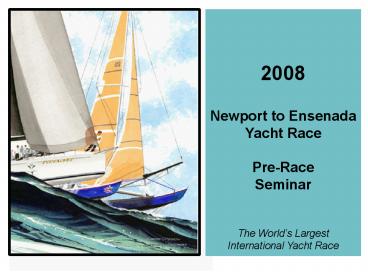Newport to Ensenada - PowerPoint PPT Presentation
1 / 32
Title:
Newport to Ensenada
Description:
Each participating boat shall be insured with valid combined single limit ... Clubs usually don't inspect your boat for compliance with Fleet and USCG ... – PowerPoint PPT presentation
Number of Views:112
Avg rating:3.0/5.0
Title: Newport to Ensenada
1
2008 Newport to Ensenada Yacht
Race Pre-Race Seminar The Worlds
Largest International Yacht Race
2
2008 Sponsors
3
Some Race Highlights
- First race - 100 boats - fastest elapsed time 21
hours 16 minutes - 1953 - MORNINGSTAR (96 ft. monohull) elapsed
time of 14 hours 21 min. - 1998 - STARS STRIPES - 6 hours 47 min.
- 2002 All boats finished by 230 PM Saturday
4
Information Sources
- This presentation and all other race documents
can be found on the NOSA Web Site - www.nosa.org
- Racing Rules of Sailing 2005-2008
- Part 1
- Part 2
- Rule 26
- www.sailing.org
5
Entering the RaceABCs of EnteringCrew List
6
Entering the Race
- Read the 2008 ABCs of Entering on the NOSA
web-site click on Race Documents - It is not necessary to submit PHRF of So. Cal.
Rating Certificate with your Entry Form - Credit Card users can enter on-line
- Submit your Entry early !
7
Insurance
- Each participating boat shall be insured with
valid combined single limit watercraft liability
insurance in an amount of not less than 300,000.
- Check with your insurer for coverage in Mexico
8
Crew List
- Complete the CREW Section of the Entry Form
with crew you anticipate will enter Mexico on
your boat - Include the Name and Citizenship and Date Of
Birth of every person on-board - Satisfies Mexican Immigration and US Customs
Border Patrol requirements - NOSA pays your port fees (thru Monday)
9
Passports
- As of Jan. 31, 2008, all adult travelers will be
required to present - proof of citizenship, such as a birth
certificate, - and proof of identity, such as a drivers
license - when entering the United States through land and
sea ports of entry.
10
Preparing Your BoatCheck EverythingSail Numbers
11
Whats Different
- Newport to Ensenada is an overnight race (maybe 2
nights) - Many of your boats systems arent used during
club races (i.e., running lights, stove, etc) - Clubs usually dont inspect your boat for
compliance with Fleet and USCG Equipment
Requirements
12
Check the Following
Required while CRUZ boat is motoring
13
Check the Following
14
Do You Have
15
Do You Have
ALL OF THE REQUIRED EQUIPMENT FOR YOUR FLEET
USCG
16
Equipment
- NOSA will randomly inspect boats after finishing
to verify that all required equipment is
on-board. - The Equipment Requirements are
- All monohull boats PHRF Standard Equipment List
for Category I Races - All multihull boats ORCA Equipment List for
Coastal Races - All boats US Coast Guard Equipment Requirements
17
Sail Numbers
- Make sure your boats SAIL NUMBER is large enough
to be seen from the NOSA Start and Finish Boats - NOSA looks for the number on the main sail
- Advise NOSA of any alternate sail numbers you
will use
18
Sail Numbers
Sail Number on Mainsail
OR
Sail Number on placard attached to lifelines
19
Checking InSkippers PacketCheck-In Boat
20
Skippers Packet
- Will be available at Bahia Corinthian Yacht Club
- Contains instructions and forms
- Lists of competitors, etc
- Sponsor items
- Check NOSA web site for schedule
21
Check-In Boat
Pass by one of the Check-In boats and hail your
sail numberbe sure you get a response
22
Check-in
CHECK-IN
CHECK-IN
Harbor Entrance
STARTING AREA
CHECK-IN
23
Starting the RaceStart LineSignalsGetting a
Clean Start
24
Whats Different
- There are two start lines
- The Starting Sequence is different
- There are 500 boats in the race and probably
25-30 in your class - There is a large spectator fleet
25
New for 2008
- Classes
- Class Breaks
- Inshore/Offshore starting assignments
- Code flags for classes
26
Two Start Lines
Center Boat
Inshore Wing Boat
Offshore Wing Boat
I
O
I
O
Inshore Line
Offshore Line
Stand-Off Mark
Stand-Off Mark
Stand-Off Mark
Stay 200 yards clear of start line until your
start sequence
27
Pennants
- Class Pennant
10-Yrs 1- Yr Class Winner
28
The Start
- Race announcements will be made on VHF Channel 6,
beginning at 1130 AM. - ATTENTION signal is scheduled for 1150.
- First WARNING is scheduled for 1155 and first
START is scheduled for NOON. - Any failure of the starting gun, horn, or VHF
radio will not constitute grounds for redress.
29
Locations of Signals
GUN
30
Rule 26Starting System
SIGNAL FLAG/SOUND MINUTES WARNING Class Flag up,
1 sound 5 PREPARATORY P Flag up, 1
sound 4 ONE-MINUTE P Flag down, 1 long
sound 1 STARTING Class Flag down, 1 sound 0
31
Modified Starting System
NO FLAGS UP FOR 5 MINUTES
1150 ATTENTION
1155 WARNING
1205 WARNING
1200 START
1210 START
32
Starting
- 2-3 knot current may drive you over the line
- What is the favored end of the line ?
- Line skew
- Wind direction and strength
- Possible wind shifts
- Clearest air
- Least amount of congestion
- Avoid a possible protest
- Do not get caught in an over-early situation
- It is VERY difficult to return and re-cross the
line































